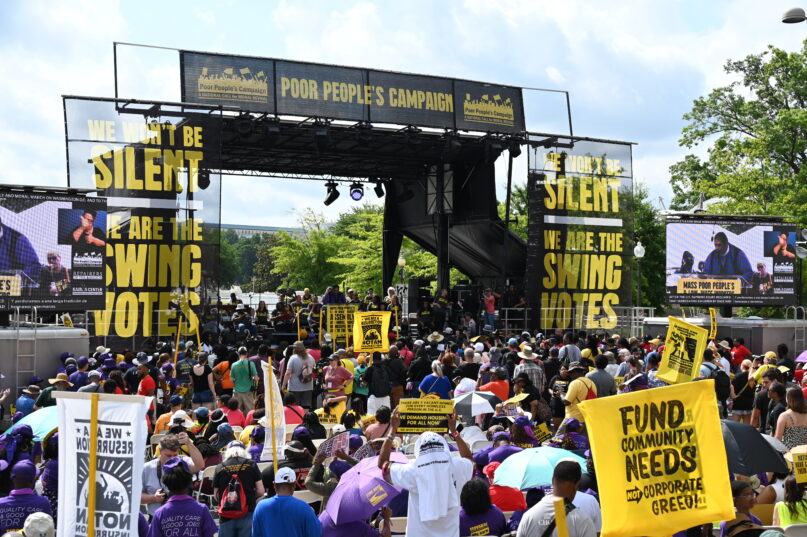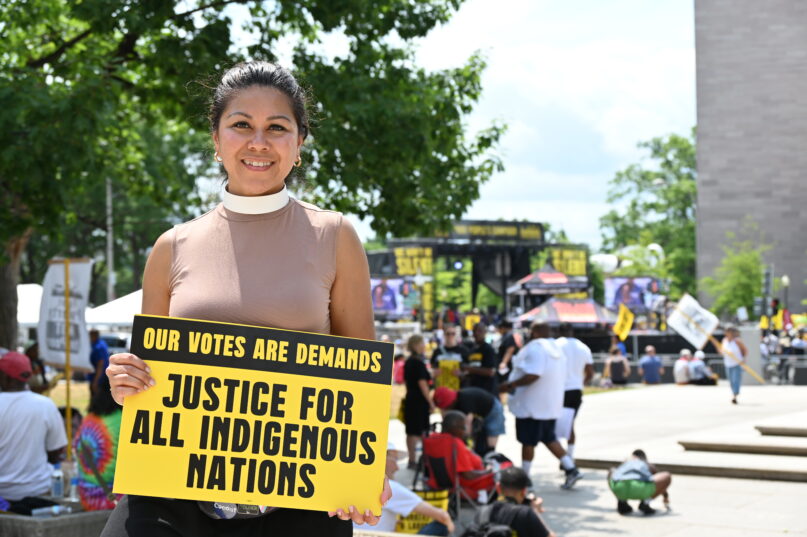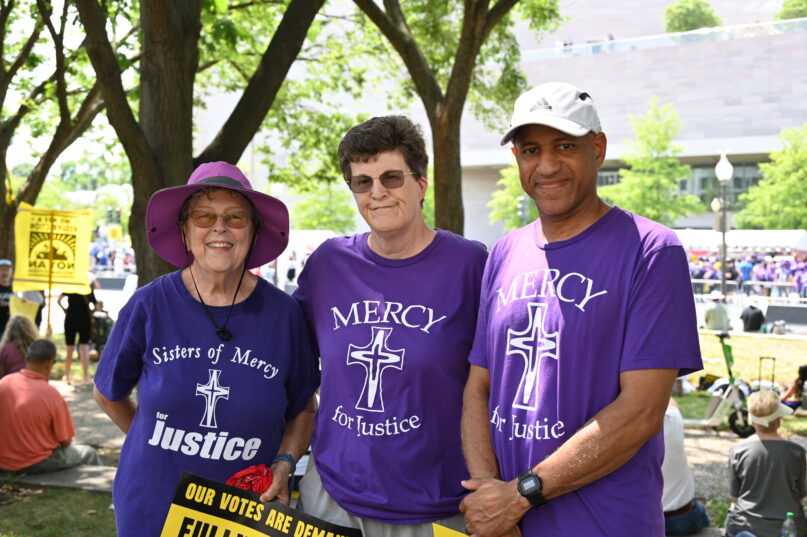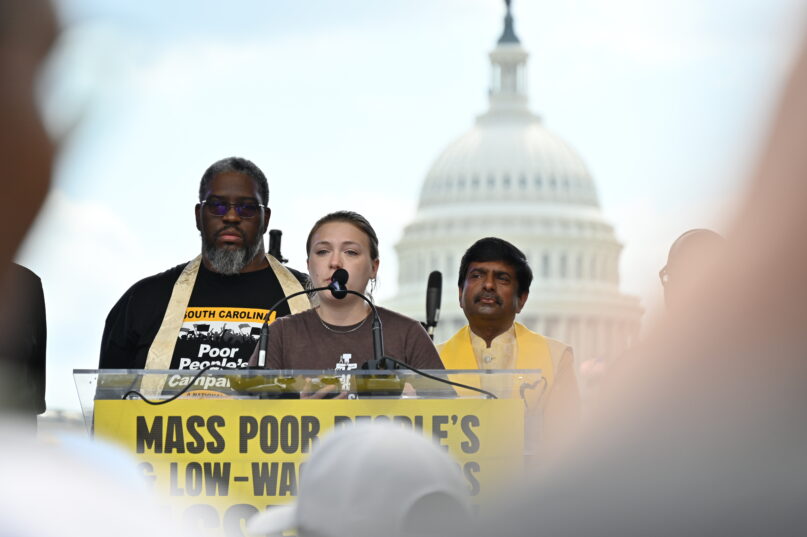
WASHINGTON (RNS) — Thousands of clergy, union members and activists rallied on behalf of the poor near the U.S. Capitol on Saturday (June 29), with faith leaders calling for lawmakers to embrace a slate of policies and for low-wealth Americans to make their voices heard in November as the nation’s “largest potential swing vote.”
The Rev. William Barber, co-chair of the organizing group the Poor People’s Campaign, declared to the sprawling crowd Saturday morning that poor people — who he stressed represent members of both major parties — are one of the largest untapped voting blocs in the country. Citing studies compiled by Poor People’s Campaign, Barber argued poor and low-wealth people do not vote to their full potential, despite making up around 30% of the national electorate and close to 40% of voters in battleground states.
Were the poor to vote with full strength, Barber said, they could potentially elect lawmakers who support policies focused on the wide range of topics that impact the poor, such as voting rights, raising the federal minimum wage, housing issues, LGBTQ rights and climate change.
“Like the Prophet Moses, honored by Jews, Muslims, and Christians, led the people out of bondage of Egypt, it’s time to rise,” he said. “Like the dry bones in the valley of Ezekiel’s vision, we’ve got to rise. Like the ancient vision of the prophet, when the stones that the builders rejected became the chief cornerstone of a new reality, we have got to rise.”

A crowd gathers at a Poor People’s Campaign event outside the U.S. Capitol on June 29, 2024. (RNS photo by Jack Jenkins)
Speakers at the demonstration, which has been planned for months and recently promoted by Barber on The Daily Show with Jon Stewart, grappled with two major political happenings that took place this week: a Supreme Court decision upholding bans barring homeless people from sleeping outside in certain cities, and the presidential debate between President Joe Biden and former President Donald Trump.
Barber, who personally endorsed Biden ahead of the 2020 election and preached at the president’s inaugural prayer service, seemed dubious of calls for the president to halt his re-election bid in the wake of his widely panned debate performance, which included moments when Biden paused for long periods of time or lost his train of thought. Noting an array of issues that impact the poor are at stake in the 2024 election, Barber — who walks with a cane and has been public about his own health struggles — suggested Biden’s poor performance shouldn’t be seen as disqualifying.
“In my tradition, Moses stuttered, but he brought down Pharaoh,” Barber said, to cheers. “Jeremiah: depression, but he stood up for justice. Jesus was acquainted with sorrow. Harriet Tubman had epilepsy. People getting caught up on how a candidate walks — well, let me tell you, I have trouble walking, but I know how to walk toward justice.”
Even so, Barber and other speakers lamented the lack of conversation about poverty this campaign season. Barber voiced similar frustrations during the 2020 election, when Biden and several other Democratic nominees participated in a Poor People’s Campaign candidates forum. On Saturday, Barber announced his group would send statements to major networks imploring them to bring up the poverty issues at any future televised debates.
“In politics, there is a dirty, ugly, open secret that the word ‘poverty’ — the topic of poverty — is a taboo subject,” said the Rev. Adam Taylor, president of Sojourners. “We saw that displayed in the first presidential debate on Thursday night where the candidates spend more time debating their golf game than they did debating what would help all of us.”
Other religious speakers included Wendsler Nosie Sr., Founder and Leader of the Apache Stronghold; the Rev. Terri Hord-Owens, General Minister and President of the Christian Church (Disciples of Christ); the Rev. Leslie Copeland Tune, Senior Associate General Secretary of the National Council of Churches; the Rev. Theresa Lewallen of the Episcopal Diocese of Virginia; Sheila Katz, head of the National Council of Jewish Women; the Rev. Jimmie Hawkins, Advocacy Director for the Presbyterian Church (USA)’s Office of Public Witness; and the Rev. Abhi Janamanchi, a Unitarian Universalist minister who also represented Hindus for Human Rights.
The Supreme Court’s decision was also a subject of scrutiny, with Poor People’s Campaign co-chair the Rev. Liz Theoharis blasting the justice’s ruling on Grants Pass v. Johnson from Friday, which ruled that cities may ban homeless residents from sleeping outside.
“It is wrong for the highest court in the land to criminalize homelessness, to rule that you cannot breathe in public — on a bench, in your car, or in a park — if you do not have a home,” Theoharis said.

The Rev. Mira Sawlani-Joyner, the Minister for Justice, Advocacy and Change at New York’s historic Riverside Church, attends a Poor People’s Campaign event outside the U.S. Capitol on June 29, 2024. (RNS photo by Jack Jenkins)
The SCOTUS ruling was also on the mind of participants in the crowd, such as the Rev. Mira Sawlani-Joyner, the Minister for Justice, Advocacy and Change at New York’s historic Riverside Church.
“We can see that our country is moving in the direction where we are no longer caring for the people who are most impacted in our nation by poverty,” she said, adding: “Shelter and housing is a right for everybody.”
Sawlani-Joyner also rejected what she described as efforts to divide Americans against each other, pointing to heated debates over immigration.
“We say things like, ‘We have an immigration problem in this nation, look at these immigrants coming in and taking all our resources,’” she said. “The thing is, those resources weren’t there to begin with: They’re all being hoarded by the people at the top, and we need to have equitable distribution of our resources.”
Sawlani-Joyner was echoed by the Rev. Brett Wilson, pastor of Georgetown Lutheran Church in Washington, who stood nearby. She often sees people at her church’s drop-in center for the unhoused, she said — sometimes more frequently than rank-and-file parishioners.
“That’s my congregation and community, and I see their struggle — I know that homelessness is not a crime,” she said. “We’ve got to stand up and speak out.”
She added: “I think it’s not time to go to church. It’s time to be the church.”

Mary Pendergast, Terri Bednarz, and Lamar Bailey, advocates with the Sisters of Mercy, attend a Poor People’s Campaign event outside the U.S. Capitol on June 29, 2024. (RNS photo by Jack Jenkins)
Several Catholic groups, such as the Sisters of Mercy, had representatives at the event. Among them was Mary Pendergast, a nun from Rhode Island who said she attended the gathering to offer a “moral witness,” and was among those who addressed the crowd.
“We have about 1,600 homeless people (in Rhode Island), and there are some shelters, but they’re not safe,” Pendergast said in an interview, referring to dynamics advocates argue prevent unhoused people from using shelters. “They’re about 600 people a night in encampments and on the street. And they’re there because of policies.”
The event also included speeches from labor leaders as well as a number of people impacted by poverty. But in some cases, speakers identified with several of the categories at once: Gabriela Martinez, an Associate of Campaigns for Franciscan Action Network, first noted that “we are all children of God, no matter your color, or where you live, or how much money you make.” She then recounted her experience as a child growing up near pollution, which researchers have long argued disproportionately impacts the poor and leads to higher rates of various diseases.
Martinez recalled smelling rancid odors while playing in playgrounds near industrial centers outside Philadelphia as a child and was later diagnosed with Type 1 diabetes. When her family moved to Ohio, she drove by foul-smelling petrochemical plants that blackened the sky on the way to school, and was later diagnosed with a thyroid disorder. She now lives across the street from a Superfund site.
“My whole life I’ve been running, only to find that there is nowhere to run in this country that is not contaminated by the disease of injustice,” she said, her voice wavering with emotion. “Meanwhile, a three month supply of my insulin, that is medically necessary, retails at $1,600. At the federal minimum wage, someone with diabetes has to work 28 full days full time (to afford that). The child me screams: Why?”
She then looked up at the crowd, closing with a call to action.
“I look at all of us and I know that we’re the solution to our problem,” she said. “Forward together!”
The crowd shouted back: “Not one step back!”

Gabriela Martinez, Associate of Campaigns for Franciscan Action Network, addresses a crowd at a demonstration organized by the Poor People’s Campaign outside the U.S. Capitol on June 29, 2024. (RNS photo by Jack Jenkins)
Source link




